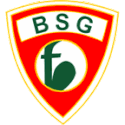SV Prussia Frankfurt
The SV Prussia Frankfurt (Oder) is in the eastern Brandenburg independent city -based sports club.
Club history
In 1959, the Frankfurt (Oder) semiconductor plant went into operation, which developed into one of the leading microelectronics companies in the GDR . However, it took over ten years before the company's own company sports association (BSG) semiconductor plant was founded on August 31, 1970 . She took over the athletes from BSG Motor Frankfurt (Oder), which was founded on August 22, 1959. With the powerful sponsoring company in the background, the new BSG quickly grew into one of the most powerful sports clubs in the GDR district of Frankfurt. In addition to the soccer team, the badminton section became known nationwide. With more than 2900 members, the BSG was one of the largest sports communities in the district.
After the economic upheaval as a result of the political change in 1989 , the economic basis of the company sports association ceased to exist, and its continued existence could only be secured by transforming it into a club under German law. For example, previous BSG members founded a new sports club in 1990, which they named “Preußen electronic” with reference to the club that existed from 1929 to 1945 and the company Mikroelektronik und Technologie GmbH, which was now a sponsor . The electronics company changed its structure and name several times and after the end of the sponsorship, the association finally dropped the addition "electronic" and has been called SV Preußen Frankfurt (Oder) since 1990. Its top performing departments include badminton and boxing. For example, the former European junior boxing champion Sebastian Köber started at SV Preußen. The club also offers sports such as basketball, volleyball, table tennis and chess.
Soccer
BSG Motor already ran a football section. Their first men's team was promoted to the then third-class district league Frankfurt (Oder) in 1968 . As a newcomer she was able to secure the league with a 9th place. After the transition to the BSG semiconductor plant, the team played another nine years in the district league, where they mostly placed in the top half. The 1977/78 season ended with winning the district championship, with which the qualification was linked to the second-rate GDR league . Even in the new area, the class could be held with rank 6, thanks in part to striker Dieter Turobin, who was second best goalscorer in league season B with 17 goals. In the 1979/80 season the BSG semiconductor factory achieved its best result in the GDR football era with 5th place. The starting eleven had the following appearance:
|
Ralf Wilken (16 missions, 22 years) |
| Uwe Lier (11/28) |
| Harald Jurchen (22/26), Frank Böttger (17/21), Norbert Kloschinski (15/22) |
| Uwe Pfeifer (19/27), Jürgen Brosin (22/29), Peter Minack (17/27) |
| Uwe Müller (19/19), Roland Bohn (22/22), Dieter Turobin (21/26) |
In the 22 championship games, coach Klaus Gade used 21 players with an average age of 23.2 years. The average age of the starting eleven was 24.4 years. In the city of Frankfurt (Oder), which is not very enthusiastic about football, and as the second force behind the league club Vorwärts Frankfurt , the Fritz Lesch Stadium, which at that time had a capacity of 4,000 spectators, only attracted around 300 visitors.
One year after the good placement, HLW had to relegate in 1981 as the third from last team from the GDR league. Although the immediate resurgence succeeded, but in the league season 1982/83 only the last place could be achieved, and then the team played until 1990 in the third-rate district league.
League statistics in GDR football:
- District league Frankfurt (Oder): 1968–1978, 1981/82, 1983–1990
- GDR League: 1978–1981, 1982/83
After the end of the GDR football business, the new Prussia club was incorporated into the Brandenburg League. There, however, the squad was not enough for relegation, so that relegation was inevitable. After years of insignificance, Prussia Frankfurt was only able to establish itself permanently in the seventh-grade state class Brandenburg in 1999. In the 2008/09 game year, he was promoted to the Landesliga Süd.
FC Union Frankfurt (Oder)
| FC Union Frankfurt | |

|
|
| Basic data | |
|---|---|
| Seat | Frankfurt (Oder) , Brandenburg |
| founding | July 1, 2010 |
| Colours | red-green-white |
| president | Konrad Pintaske |
| Website | http://fc-union-ffo.de/ |
| First soccer team | |
| Head coach | Reiko Heinrich |
| Venue | Baumschulenweg sports field |
| Places | 1,100 |
| league | District Oberliga Ostbrandenburg |
| 2015/16 | 3rd place |
On July 1, 2010, the soccer departments of SV Preußen Frankfurt and Post SV 1928 Frankfurt merged to form FC Union Frankfurt (Oder) . The first team of the newly founded club has since played on the Baumschulenweg sports field on which the Post SV previously played, the Fritz Lesch Stadium, the former home of SV Prussia, is now the training and venue for the youth of FC Union. The office of the association is also located at the Baumschulenweg sports field.
badminton
The badminton section was founded in BSG Motor in 1962. Three years later, the game was started. The club's greatest team success was the rise of the adult team, now acting as BSG semiconductor factory, into the GDR league. In the individual disciplines, Annemarie Richter and Klaus-Peter Färber ensured the greatest successes. In 1974 they won the bronze medal in mixed at the GDR championships in Suhl .
people
- Christoph Ringk - played from 1981 to 1982 for BSG semiconductor factory, later 191 league games for FC Vorwärts Frankfurt and BSG Stahl Brandenburg
- Annemarie Färber and Klaus-Peter Färber , third in mixed at the GDR Badminton Championships in 1974

